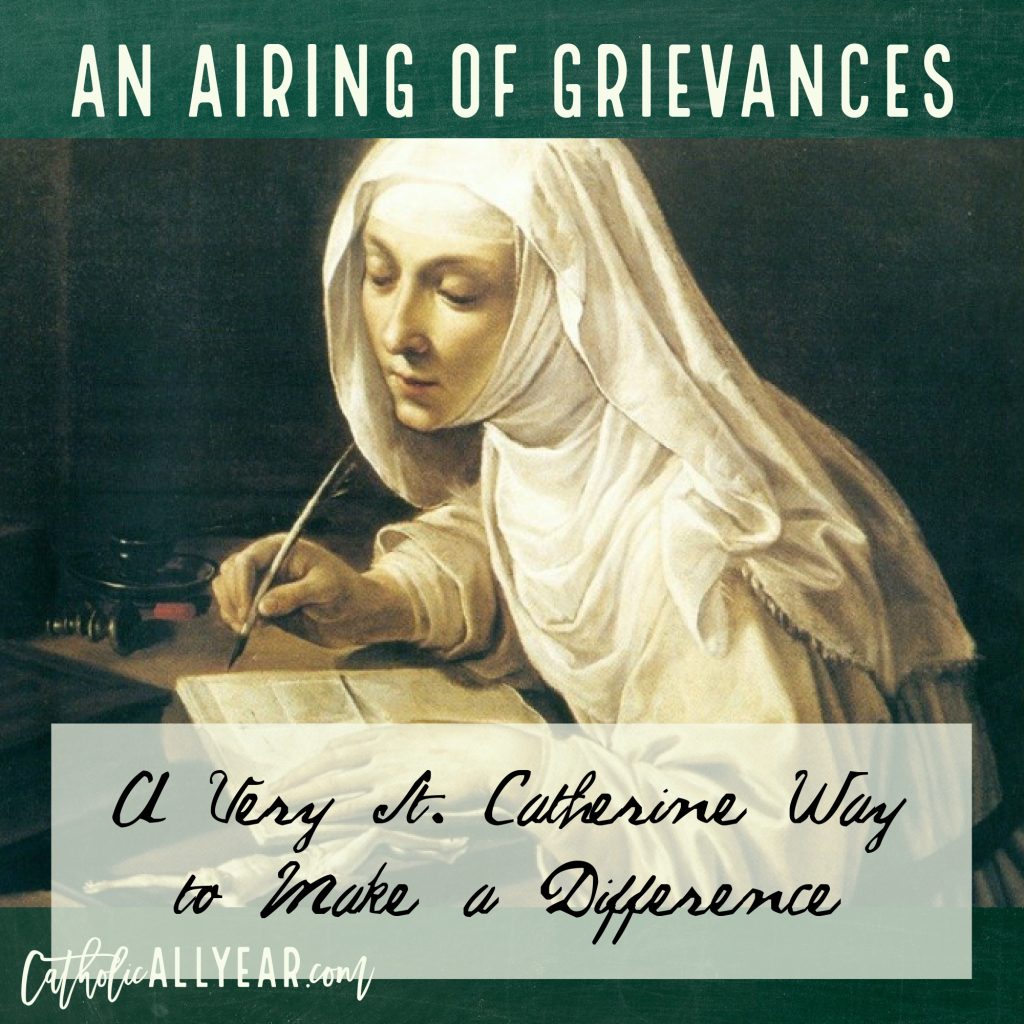Do you know St. Catherine of Siena? She’s one of our favorite saints! A doctor of the church, and a marvelous example of “holy feistiness”. She did everything with a Holy Spirit-driven intensity! This intensity gave great fuel to her prayer life and inspired a holy boldness in following God’s will.

St. Catherine was not of noble birth, she didn’t have any formal education, and hardly any qualifications. But despite these apparent deficits on her resume she was sought out as an advisor by many European leaders because of her holiness. She even “advised” those who didn’t necessarily want to be advised. Pope Gregory XI, who didn’t want to leave France to return the papacy to its rightful spot in Rome . . . we’re looking at you. She also brought the Italian government around to remove a false pope from Rome. Removing fake popes and coordinating international politics are no small matters! But, they’re the fruits that came from Catherine’s holy boldness when she refused to take any excuses back to God.
So what about airing OUR grievances?
If you’re ready to open a can of worms, ask your kids if they have any grievances to share about how YOUR home is run. Dinner is a great time for this!
This conversation with your kids is also a perfect time to talk about God-given authority and the duty of those in authority, how to respectfully interact with authority figures, and how to affect change in our communities (whether that’s just in our family or the larger community).
Why is this conversation important?
Throughout our lives, our children will continually encounter people in positions of authority, from us, their parents, to teachers in school, to our priests and religious, to those in civil offices. It’s important to know what this means and what, if anything, is owed to these people.
All authority on earth is given by God, we hear about this in the bible when Jesus is talking to Pontius Pilate in John 19:10-11. “‘Do you not know that I have power to release you, and power to crucify you?’ Jesus answered him, ‘You would have no power over me unless it had been given you from above. . .’”
The Catechism of the Catholic Church is very clear about the purpose of authority: “Those who exercise authority would do so as a service. . . . The exercise of authority is measured morally in terms of it’s divine origin, its reasonable nature and its specific object. No one can command or establish what is contrary to the dignity of persons and the natural law.” (CCC 2235) And our response (or duty as the CCC calls it) to rightly ordered authority is to “regard those in authority as representatives of God, who has made them stewards of his gifts. . . [and] to contribute along with the civil authorities to the good of society in a spirit of truth, justice, solidarity, and freedom.”
But what on earth do we do when we encounter someone who abuses their position of authority? Besiege the castle? Actually, no.
St. Augustine tells us “These practices, then, are eliminated, in my opinion, not with harshness, not with toughness, not in an imperious manner, but by teaching rather than commanding, by warning rather than threatening. . . . And if we use any threat, let it be done with sorrow, by threatening from the scriptures punishment in the future, not so that we ourselves are feared in our power, but so that God is feared in our words.” (Letter 22, Paragraph 5) a.k.a. airing your grievances!
The Catechism also says that “The citizen is obliged in conscience NOT to follow the directives of civil authorities when they are contrary to the demands of the moral order, to the fundamental rights of persons or the teachings of the Gospel.” (CCC 2242)
Parents have a responsibility to use their authority for the “education of their children. They bear witness to this responsibility first by creating a home where tenderness, forgiveness, respect, fidelity, and disinterested service are the rule.” (CCC 2223) Our children have the duty to “. . . obey your parents in the Lord, for this is right.” (Eph 6:1)
When Jesus institutes the priesthood he is very clear about the kind of authority that he has given to his priests. “The kings of the Gentiles exercise lordship over them; and those in authority over them are called benefactors. But not so with you; rather let the greatest among you become as the youngest, and the leader as one who serves. For which is the greater, one who sits at table, or one who serves? Is it not the one who sits at table? But I am among you as one who serves.” (Luke 22:25-27) And The Catechism sheds light on the laity’s duty to the authority of the Church hierarchy here: “Let all follow the bishop, as Jesus Christ follows his Father, and the college of presbyters as the apostles; respect the deacons as you do God’s law. Let no one do anything concerning the Church in separation from the bishop.” (CCC 896)
Wondering where the verse “Wives, be subject to your husbands, as to the Lord.” (Eph 5:22) fits into all of this? Read a bit more about that here.
The Church makes it unmistakable that authority should really be about serving those around us. Should we have expected anything else from Jesus who was constantly tipping things onto their heads? This being said as we move into the more practical application of “airing our grievances” below, some good things to think about and bring up as a family would be:
- How can our household run better so that our activities serve the family and allow us to be available to serve each other and our community?
- What are some concrete ways that I can serve my family better moving forward?
- What are some ways that our family can grow in serving each other?
Wondering about the practical ways to “Air your Grievances” as a family? Here’s a little how-to:
1. Plan it in advance! Give your family time to think and hopefully pray about the things that they’d like to talk about.
2. Make sure to have food. Talking about things that need to be changed around the house isn’t always an easy conversation, and it’s even harder if you’re hangry.
3. Take it seriously. No sarcasm or flippancy. But also, have fun! It’s important to be receptive, positive, and encouraging during your discussion.
4. Civility must reign. Conversational tones only, no berating or accusing or raising of voices. It’s a learning experience. And even if parents can’t make the requested changes, we can talk about the situation.
5. Parents get to air grievances too! But again, with respect and civility.
6. End with gratitude. It’s a good idea to finish up with some gratitude and share ways we are succeeding in our homes and with our families!
You can use this digital download as a preparation tool for the evening! Or grab one of these super cute St. Catherine of Siena notepads and pen sets to brainstorm on!
Are you needing to air some grievances outside of your family too? You can write to your town about the potholes that need to be fixed, to your state government, or to your representatives in the national government. You can also write to your bishop and to the pope!
Remember the same advice you gave your kids about having respectful conversations with those in positions of authority, and if you think that someone is doing a good job, then let them know that too!


0 Comments